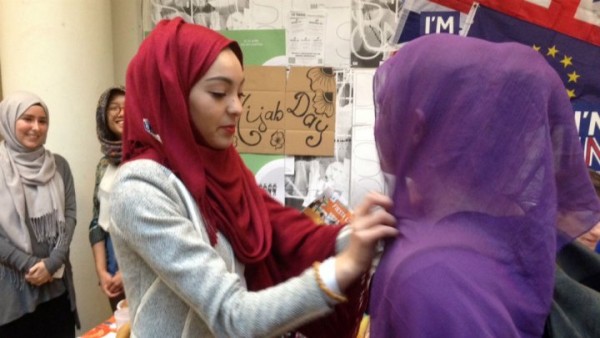
Around a dozen young women wearing colourful Muslim veils paced about nervously in the main hall of Sciences Po university in central Paris on Wednesday morning, bewildered by the numerous journalists on hand for “Hijab Day” and seemingly unprepared to answer questions about an event that had roused such attention.
They huddled around a small table, on top of which a diverse assortment of scarves had been neatly laid out. Propped up against the table a sign written in black marker read, in English, “France got 99 problems but Hijab aint one”, a rap reference that seemed lost on most passersbys.
Initially reluctant to explain why they were inviting fellow classmates to don the religious attire, they eventually gained a measure of confidence as two women stepped forward to participate.
#HijabDay at the prestigious Sciences Po university in central Paris today pic.twitter.com/7XmbIza5MZ
— Joseph Bamat (@josephbamat) April 20, 2016
“We could no longer allow people to say things supposedly on our behalf, it was time to speak for ourselves,” a student identifying herself only as Laetitia told journalists, insisting that the event aimed to encourage discussion among students, but in no way intended to convert people to Islam.
Laetitia and others in the group said they were disheartened by recent public comments by members of France’s Socialist government that likened wearing the Muslim veil to enslavement.
Last month, Laurence Rossignol, France’s minister for women’s rights, compared Muslim women who wear the hijab to “American negroes who were in favour of slavery”. More recently, Prime Minister Manuel Valls said he was in favour of a law banning head scarves in public universities.
An Australian student spending one semester in Paris was one of the first to accept the challenge. Hannah Bartlett threw on a bright purple scarf with the help of one of the organisers. “Supporting other women is important. Wearing a veil is their choice,” she said, expressing surprise the issue was so controversial in France.
The Islamic veil, along with other religious symbols like crosses and Jewish stars, have been banned in public primary and high schools for both students and teachers since 2004. In 2011, French lawmakers banned the wearing of full-face veils or masks – anything that disguises the wearer’s identity, ostensibly for security reasons. The law is aimed at all face coverings, but critics say that, in practice, the law disproportionately affects and stigmatises Muslim women.
Student Massil Mameri, who is working towards a masters degree in finance, said he welcomed the initiative. “This is a place of learning. These women are here to explain their beliefs and answer people’s questions. I am not Muslim, but I think it’s an opportunity to better understand the issue.” Asked if he would be willing to wear a hijab that day, he replied, “Why not?”
A ‘shocking’ event
Josselin Marc, president of the Sciences Po chapter of the UNEF student union, explained that the event had gained unexpected attention after far-right groups found out about it, posting insulting comments on social media in recent days. Many students who had been largely indifferent to “Hijab Day” then rallied to support it in view of the attacks, Marc explained.
“This should not have caused such a stir. It is an event that respects the rules of this university and the law in general,” he said, noting that the UNEF union did not take a position on wearing the hijab inside institutions of higher learning, but supported an initiative meant to “advance public debate on an important topic”.
Sciences Po adopted a similar stance as “Hijab Day” inflamed passions, telling the AFP news agency that the fact that the event was being held on campus did not mean the school was endorsing it. Sciences Po is one of France’s oldest and most influential universities, known for educating France’s political and business elite.
It has gained attention in the past for marching to a different beat. It was the first institution of higher learning in France to introduce affirmative action in its admissions process to bring in students from lower-income suburbs – a measure that is absent in most French schools and enjoys little support among the public.
Helena was among the Sciences Po students who disapproved of “Hijab Day”, calling the event “shocking” as she watched journalists fire questions at one of the organisers. “It’s ridiculous to hear them tell us that [the hijab] is just a piece of fabric, especially in this day and age,” she said.
French MP Bruno Le Maire, a member of the opposition Les Républicains party and a presidential hopeful, on Wednesday said he opposed the event. “In France, women are visible. No to proselytism!” Le Maire, who is also a professor at the university, wrote on his Twitter account.
Anais, another “Hijab Day” organiser, said the initiative was meant only to demystify the Muslim veil among classmates and empower women to express themselves on the subject freely. She said no other follow-up events were planned.

Leave a Reply
You must be logged in to post a comment.